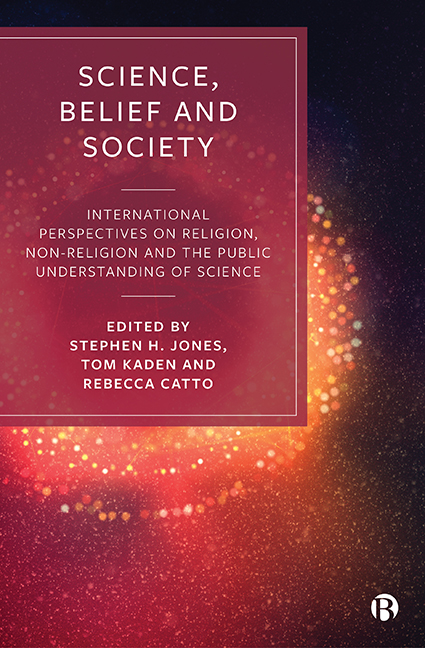 Science, Belief and Society
Science, Belief and Society Book contents
- Frontmatter
- Contents
- List of Figures and Tables
- Notes on Contributors
- Editors’ Acknowledgement
- Foreword
- Editors’ Introduction: Science, Belief and the Sociological Tradition
- PART I Methodological Challenges in the Study of Science and Belief
- PART II Belief in the Study of Science and Technology
- PART III Science, Culture and Non-religion
- PART IV Religion, Conflict and Moderation
- Conclusion: Future Directions in the Sociological Study of Science and Belief
- Index
3 - Language, Labels and Lived Identity in Debates about Science, Religion and Belief
Published online by Cambridge University Press: 27 April 2022
- Frontmatter
- Contents
- List of Figures and Tables
- Notes on Contributors
- Editors’ Acknowledgement
- Foreword
- Editors’ Introduction: Science, Belief and the Sociological Tradition
- PART I Methodological Challenges in the Study of Science and Belief
- PART II Belief in the Study of Science and Technology
- PART III Science, Culture and Non-religion
- PART IV Religion, Conflict and Moderation
- Conclusion: Future Directions in the Sociological Study of Science and Belief
- Index
Summary
Labels and their functions
Public discourse about science and belief is permeated by all manner of labels: terms like ‘creationism’, ‘intelligent design’, ‘Darwinism’ and ‘New Atheism’. Some of these labels describe a belief about evolution. Others signify a conviction about how science and religion relate. Still others describe an organization, social movement, cultural trend or group of people. In a few cases, the same label (eg ‘creationist’ or ‘New Atheist’) serves all of these functions, with the term being used to describe both a set of beliefs and the population that supposedly holds these beliefs. Labels also, as we will see, feature in social-scientific research, where they often form the basis of survey questions designed to measure people's understanding and acceptance of aspects of science. What is not typically questioned, however, is what people actually think about such labels. Are people aware of these terms? Do they identify with them, referring to themselves as ‘creationists’ or ‘New Atheists’? Do these labels accurately represent people's perspectives? Often, in both academic and popular discussions of science and belief, the implied answer to questions such as these is ‘Yes’. Commentators commonly describe certain religious groups as dominated by ‘creationists’, in the process assuming that this population holds a certain set of beliefs. This chapter, however, challenges such assumptions. Building on an emerging body of sociological scholarship (Evans, 2011, 2018; Hill, 2014; Kaden et al, 2017; see also Hill, Chapter 2, this volume), we highlight a gap between scholarly and popular categorizations of evolution belief and the views that people actually hold.
We look at the way in which labels were used in 123 interviews and 16 focus groups carried out with members of the public and scientists working in the life, biological and medical sciences in the UK and Canada. In these interviews, which focused on the theme of religion and evolution, we asked participants whether they were aware of, or identified with, any labels used to describe belief about evolution, and examined the way participants did, or did not, use terms such as ‘creationism’, ‘intelligent design’, ‘Darwinism’ and so on. Using these data, the chapter advances three related arguments. The first is that, in general, people who are not involved with organizations directly concerned with science and religion-related questions (and even some of those who are) do not identify with commonly used labels.
- Type
- Chapter
- Information
- Science, Belief and SocietyInternational Perspectives on Religion, Non-Religion and the Public Understanding of Science, pp. 55 - 78Publisher: Bristol University PressPrint publication year: 2019
